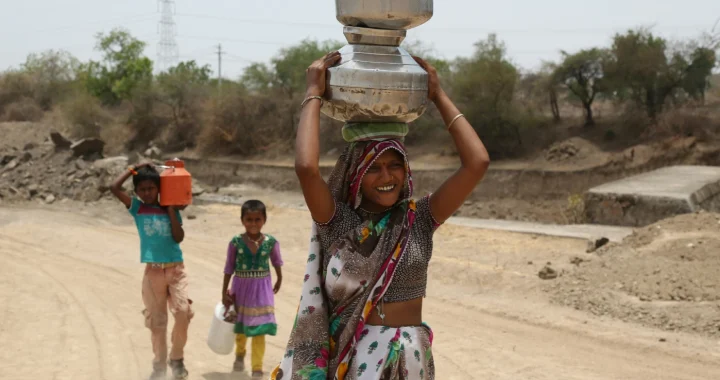Social Protection in the Age of Climate Change

Illustration by Irhan Prabasukma
Climate change is emerging as a central driver of poverty and inequality across the Asia-Pacific region, and its impacts are projected to become more severe over time. Even if we manage to limit long-term global warming to 1.5°C, up to 85% of the region’s population is expected to be exposed to multiple climate hazards, including frequent and intensified storms, floods, heatwaves, and long-term threats like sea-level rise. Without social protection, the impacts will be devastating.
Climate change reinforces poverty and inequality
Climate change disproportionately affects the region’s most vulnerable populations, who often lack the capacity and resources to cope with shocks. Marginalized groups, such as women, children, older persons, and people with disabilities, face heightened risks, perpetuating inequality over time.
Robust social protection systems will be pivotal in ensuring inclusive, sustainable and equitable development for all. However, in many countries in Asia and the Pacific, fewer than 50% of the population are covered by any form of social protection. Countries such as Afghanistan, Bangladesh, and Myanmar are among the most exposed to climate risks; yet, they have some of the lowest social protection coverage, making them particularly susceptible to deepening poverty and inequality (see figure below).

Social protection supporting climate adaptation and mitigation and building resilience
As the impacts of climate change become more pronounced, social protection will play an essential role in fostering resilience and reducing vulnerability in communities. Social protection systems are also uniquely positioned to support climate adaptation and mitigation efforts.
Transitioning to a low-carbon economy is the least we must do to halt the climate crisis looming on the horizon. However, the transition can bring disruptions. Without proper social protection, workers may find themselves unable to adapt to the changing job market.
For instance, sectors like agriculture, construction, and energy are expected to experience significant transitions. New opportunities in these sustainable-to-be industries can provide a path forward—only if social protection systems support workers through these changes. Unemployment benefits, reskilling programs, and other job transition support are essential for a just transition.
Public employment programs, coupled with social protection, are instrumental to support people to adapt to unavoidable risks or events. They also set incentives to build infrastructure (e.g. restoring natural habitat, reforestation, building sea walls, etc.) that promotes resilience against climate change events.
Moreover, rising temperatures and extreme weather events increase the incidence of heat-related illnesses, air pollution-related diseases, and vector-borne diseases. Universal access to healthcare and climate-informed health interventions can ensure that the most vulnerable populations are protected against these health risks.
Therefore, in order to strengthen people’s resilience, countries in the Asia-Pacific region must build comprehensive and inclusive social protection systems that respond to the life cycle needs of their populations, which will be heightened due to climate change. These systems should provide support for employment transitions, healthcare, income security, and food security, while also addressing displacement caused by both climate change events and policies.
Leveraging financing mechanisms and building synergies with related measures
Ensuring social protection for all requires significant funding, but it is not impossible. To meet the growing demands for social protection in the face of climate change, countries must explore collaborations with the funding mechanisms for climate action, disaster risk reduction, and humanitarian efforts. These include the newly created Loss and Damage Fund, multilateral climate funds, green bonds, humanitarian assistance and disaster risk reduction frameworks, and other financing instruments.
The Loss and Damage Fund’s main purpose is to respond to economic and non-economic loss and damage associated with the adverse effects of climate change, especially for countries bearing the brunt of it. On the other hand, multilateral climate funds, such as the Green Climate Fund or Adaptation Fund, increasingly acknowledge the social dimension of climate change policies and the role of social protection. Likewise, green, social, and sustainability bonds offer financing framework for both social as well as climate related goals, including mitigation and adaptation, and great potential to align climate and social agendas. Meanwhile, humanitarian assistance addresses climate-related shocks and crises and offers significant potential for synergy with social protection systems.
All in all, the integration and synergy between these funding instruments and social protection can transform short-term financial benefits into long-term development processes that benefit people and the planet.
Building resilience for an uncertain future
As Asia and the Pacific continue to navigate the evolving challenges posed by climate change, the role of social protection systems cannot be overstated. Strengthening these systems will be critical to ensuring that vulnerable populations are not left behind in the face of increasing uncertainty.
As the price of inaction is too high, both in human and economic terms, understanding the current landscape of social protection systems and how to progress forward is fundamental. ESCAP’s latest flagship publication, “Social Outlook for Asia and the Pacific 2024”, for instance, offers a forward-looking roadmap, including a “how-to” guide for crafting future-proof social protection systems that ensure inclusive and resilient societies, rooted in solidarity.
Ultimately, countries must take a proactive approach to reforming and expanding their social protection systems to support climate adaptation, foster economic stability, and ensure a just transition to a sustainable and inclusive future.
Editor: Nazalea Kusuma

Co-create positive impact for people and the planet.
Amidst today’s increasingly complex global challenges, equipping yourself, team, and communities with interdisciplinary and cross-sectoral insights on sustainability-related issues and sustainable development is no longer optional — it is a strategic necessity to stay ahead and stay relevant.

Stefan Urban
Stefan Urban is a Social Affairs Officer at the Economic and Social Commission for Asia and the Pacific (ESCAP) in Bangkok. He has authored numerous publications on social protection, including analytical work on the intersection with climate change and supported various social protection reforms around the world. Before joining the UN systems in 2015, he managed social policy and human rights projects for the European Union.


 Embracing the Business Value of Sustainability
Embracing the Business Value of Sustainability  American Farmers Call for Government Support Amidst PFAS Contamination
American Farmers Call for Government Support Amidst PFAS Contamination  Asia Pacific’s SDG Progress Faces Major Setbacks
Asia Pacific’s SDG Progress Faces Major Setbacks  Exploring the Bidirectional Relationship Between Olympic Games and the Environment
Exploring the Bidirectional Relationship Between Olympic Games and the Environment  The Hidden Threat of Tire Pollution to Salmon Populations
The Hidden Threat of Tire Pollution to Salmon Populations  Understanding the Climate-Care Nexus
Understanding the Climate-Care Nexus